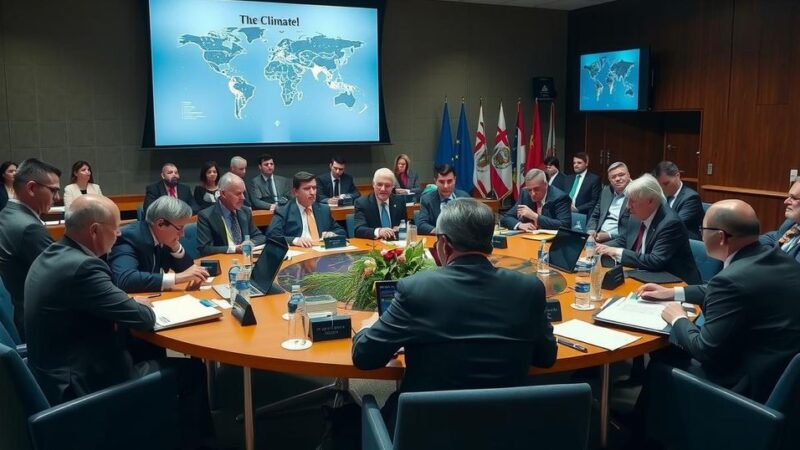This article discusses the urgent need to tackle climate change highlighted at COP29 in Baku. It critiques the slow progress in climate action and the inadequacies of financial solutions like climate funds. The role of vulnerable nations such as Bangladesh is emphasized, particularly their advocacy for adaptation and mitigation resources. The article also highlights the physical and mental health impacts of climate change, biodiversity loss, and the consequences of inaction, ultimately calling for enforceable global climate commitments.
As the global community convened for COP29 in Baku, the urgency to address climate change was stark. The Conference of the Parties (COP), initiated in 1995, represents collective international efforts aiming to confront the escalating climate crisis, a discussion that started at the 1992 Earth Summit in Rio de Janeiro. Despite numerous discussions over decades, tangible progress in climate action often appears agonizingly slow. A significant request in earlier conferences has been the establishment of a global climate fund, but its implementation has frequently been inadequate. While such funds can alleviate some adverse impacts, they cannot resurrect what has been irrevocably lost.
Climate change resembles a gradual yet severe affliction, subtly impairing our planet as society pursues immediate gains over long-term sustainability. The once prevalent magpie robin, or ‘doyel,’ the national bird of Bangladesh, is now nearly extinct. Financial contributions cannot mend the harm inflicted on nature, nor can they compensate for the collective negligence that led to these losses.
Bangladesh has emerged as a formidable voice in the global climate dialogue, especially at COP28, where the nation secured a $700 million fund to combat climate-induced loss and damage. It advocated for equitable resource distribution for adaptation and mitigation, highlighting the unmet annual commitment of $100 billion from developed countries. At COP29, Bangladesh approached the talks with renewed urgency, facing escalating global temperatures, increasing natural disasters, and significant biodiversity loss.
The physical manifestations of climate change are evident worldwide, with Bangladesh disproportionately affected. Rising sea levels have submerged coastal areas, displacing millions. Erratic monsoon patterns, persistent droughts, and severe flooding threaten agricultural viability and food security. The World Meteorological Organization reported in 2022 that Asia experienced 81 weather- and climate-related disasters, resulting in over 5,000 fatalities and causing economic damage exceeding $36 billion. The impact extends to public health, with heatwaves, air pollution-related respiratory diseases, and waterborne illnesses exacerbated by stagnant flooding.
Beyond environmental effects, climate change also impacts mental health. Research published in the Frontiers outlines how extreme weather events, including floods and hurricanes, as well as gradual changes like rising sea levels, induce psychological distress. Conditions such as post-traumatic stress disorder, anxiety, and eco-anxiety are increasingly prevalent, particularly among vulnerable groups such as women and children. Addressing these mental health challenges necessitates fostering community resilience and promoting reconnection with nature.
Biodiversity is facing unprecedented threats. Research from the National Audubon Society indicates the alarming disappearance of climate refugia—essential habitats for species that help maintain ecological balance. If global temperatures rise by 3°C, vital habitats may vanish, leading to disruptions in food chains and ecosystems. Protecting biodiversity is crucial; thus, aligning with global initiatives such as the 30×30 pledge—aiming to conserve 30 percent of the world’s land and water by 2030—is essential.
The stark consequences of climate indifference become increasingly undeniable. The UN Environment Programme notes a 1.1°C rise in global temperatures since pre-industrial times, triggering more frequent and severe climate events. The Paris Agreement underscores the necessity of limiting global warming to 2°C; however, experts emphasize keeping it below 1.5°C. Inaction poses grave risks to vital ecosystems and the livelihoods dependent on them, underscoring the critical nature of gatherings like COP29.
At COP29, dialogues converged on climate change, poverty, and inequality, with G20 nations—responsible for three-quarters of global emissions—supporting climate finance. However, prioritizing loans over grants for vulnerable populations drew criticism. Despite a pledged annual contribution of $100 billion from affluent nations, demands for enhanced financial support remain persistent, highlighting a disconnect between promises and delivery. Bangladesh continues its advocacy for renewable energy, disaster management, and resilient agriculture, pushing for equitable finance and technology transfer.
While facing monumental challenges, viable solutions are achievable through transitioning to renewable energy, curtailing methane emissions, and investing in nature-centric approaches. Bangladesh’s leadership at COP29 acts as a beacon for collective action. As the world stands at a crucial juncture, it is imperative for nations to transform their commitments into enforceable actions to secure a sustainable future for both the planet and humanity.
The struggle against climate change requires more than financial resources or policies. It demands empathy, accountability, and a profound reevaluation of our valuation of the earth. The real cost of complacency extends beyond environmental degradation; it translates into a drastically altered world for future generations.
The article focuses on key discussions surrounding climate change at the COP29 conference, highlighting the ongoing urgency to address this global crisis. It reflects on the historical context of international climate negotiations, beginning with the 1992 Earth Summit, and the limitations of financial strategies like climate funds. The article also emphasizes Bangladesh’s leadership and advocacy in the climate dialogue, particularly concerning the impacts of climate change on vulnerable populations, biodiversity, and mental health. It illustrates the repercussions of inaction and stresses the need for collective, enforceable climate actions.
In conclusion, the fight against climate change necessitates unified global action, prioritizing sustainable practices over short-term economic gains. The insights shared at COP29 illuminate the urgent need for enforceable commitments from world leaders in addressing climate impacts, particularly for vulnerable nations like Bangladesh. A multifaceted approach that incorporates mental health considerations, biodiversity protection, and equitable resource distribution is essential to forge a resilient and sustainable future. As the world grapples with these challenges, it is crucial to recognize that achieving meaningful progress relies on more than just financial pledges; it requires a fundamental change in how humanity values and interacts with the natural environment.
Original Source: www.newagebd.net






